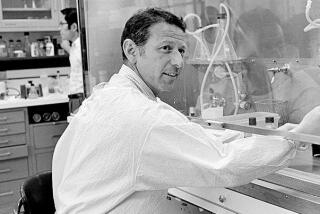Amgen Sues Cetus Over Gene-Splicing Technology
- Share via
In what appears to be the first patent suit involving gene-splicing technology, a Thousand Oaks firm is asking a federal judge to overturn the only U.S. patents issued for a promising new anti-cancer substance called interleukin-2.
The suit was filed by Amgen in U.S. District Court in San Francisco against Cetus Corp., an Emeryville, Calif., firm that holds the patents. Cetus supplied the drug, also known as IL-2, used by Dr. Steven A. Rosenberg in celebrated clinical trials at the National Cancer Instiatute last year.
Amgen, which says it developed a different form of IL-2, sued preemptively, said Robert Weist, its general counsel. Amgen said that Cetus had threatened to sue for patent infringement. Amgen’s lawsuit claims that Cetus’ patents violate federal patent law.
Weist would not elaborate other than to say that neither side is accusing the other of stealing trade secrets.
Experts say the IL-2 dispute illustrates the problems of an industry in which different versions of the same product are developed by different companies around the same time.
Cetus vowed to defend its patents vigorously. Its president, Robert Fildes, said the company is considering a countersuit and denied that it had threatened any action against Amgen or other IL-2 makers.
“The onus is clearly on Amgen,” he said. “We’ve got a patent and they haven’t.” The suit challenges three patents issued from May 21, 1985, to Feb. 11 of this year. Cetus said it has a fourth patent that Amgen has not challenged.
IL-2 is a naturally occurring protein and immune system stimulant considered among the most important new products being made through recombinant DNA, or gene splicing--a process that involves combining genetic material from two sources, such as humans and bacteria.
Amgen, Cetus and at least one other company, Seattle-based Immunex, all make IL-2 now being tested on humans. Fildes said Cetus expects to have its version on the market in 1988. Peter Drake, an analyst at Kidder, Peabody & Co., estimates that U.S. makers will produce $300 million to $400 million of IL-2 by 1990.
Iver Cooper, general counsel to the Assn. of Biotechnology Companies, a trade group, said that at least eight biotechnology patent suits are pending in the United States and Europe but that Amgen’s is the first over recombinant technology.
“This is a situation we’ll probably continue to see in the future,” said Misha Petkevich, an analyst at Hambrecht & Quist in New York.
Drake added that increasing litigation probably will make biotechnology stocks more volatile.
James McCamant, editor of the Medical Technology Stock Letter, said few suits have emerged so far because not many products have been approved for sale. Also, he said, the U.S. Patent Office, in attempting to sort out the conflicting claims of various biotechnology firms, has been slow to issue patents.
More to Read
Inside the business of entertainment
The Wide Shot brings you news, analysis and insights on everything from streaming wars to production — and what it all means for the future.
You may occasionally receive promotional content from the Los Angeles Times.










